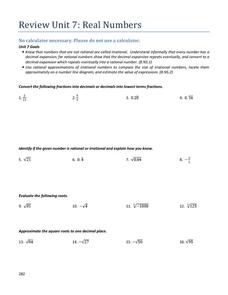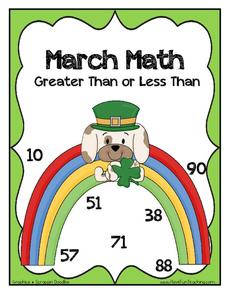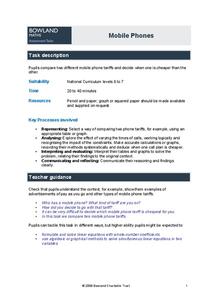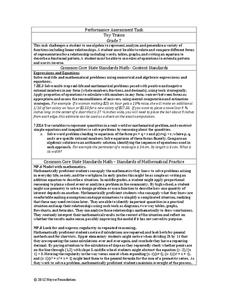Illustrative Mathematics
Ordering Numbers
Deepen the number sense of young mathematicians with this unique ordering exercise. Given a list of the numbers 1, 5, 10, 50, and 100, young learners must determine where the numbers from a second list fit in the sequence. To increase...
Common Core Sheets
Comparing Visual Fractions
Introduce comparing fractions with a worksheet containing visual models. Young mathematicians must first identify the part being described in each model and then write greater than, less than, or equal to. Learners prepare to compare...
Common Core Sheets
Comparing Numerical Fractions (Same Numerator or Denominator)
Compare two fractions with like denominators or like numerators in an excellent skills practice worksheet. With 10 sets of worksheets, the packet uses numbers and visual models to help young mathematicians determine greater...
Charleston School District
Review Unit 7: Real Numbers
Provide pupils with problems to check their understanding of the concepts within the unit. The seven-part series of lessons covers concepts related to irrational numbers. Learners convert between fractions and decimals, estimate the...
Common Core Sheets
Comparing Numerically (Different Denominator)
Compare fractions with different denominators in a handy Common Core based worksheet. Fourth graders decide which fraction is larger or smaller based on the parts that make up a whole (denominator) and the parts being described...
Charleston School District
Pre-Test Unit 7: Real Numbers
Don't be irrational! Use this pre-test to assess your classes' ability to work with all types of real numbers. The lesson asks learners to estimate value, evaluate roots, and order numbers. This begins a series of lessons on the real...
Illustrative Mathematics
Comparing Rational and Irrational Number
Algebra learners must know how to use rational numbers to approximate irrationals. This resource asks participants to decide which number is larger without using a calculator. It makes a great exercise to use as a five-minute transition...
Oregon Department of Education
Building Number Sense
It's never too early to begin a child's math education. This collection of fun hands-on activities engage youngsters in building their number sense as they learn how to count objects, identify numerals, compare amounts, and much more.
Curriculum Corner
Fifth Grade Summer Math Booklet
A 33-page packet focuses on fifth-grade math concepts. Learners practice rounding numbers to the hundred thousands, thousands, hundreds, tens, ones, hundredths, thousandths, and hundred thousandths. They also compare whole...
Curriculum Corner
Academic Math Vocabulary
The ABCs of math are so important. Find commonly used math terms in a 42-page packet. Each page has the word, a place to write the definition, and a place to give specific examples of the term. A must-have for all math classrooms!
Los Angeles County Office of Education
Assessment For The California Mathematics Standards Grade 4
Have scholars show what they know with a 20-page assessment aligned to the California State Standards. The test covers concepts such as large and whole numbers, all four mathematical operations, fractions, decimals, geometric figures,...
Reading for Meaning
Sample Lessons and Worksheets
If you need to bulk up your reading comprehension worksheet collection, take a look at a resource that includes graphic organizers and reading comprehension questions. The series of 50 worksheets addresses novels such as Julie of...
Curriculum Corner
Second Grade Summer Math Practice Book
Stop the summer lag with a set of second grade Common Core based math practice sheets. Learners fill in hundreds charts with missing numbers up to 1,000. They practice writing numbers in standard, expanded, and word form. Children also...
One Billion
Math, Age 3-5
Jump start children's math education with this fun basic skills resource. Offering dozens of different touch-and-swipe activities with colorful graphics, this program is perfect for all young learners.
Illustrative Mathematics
Who is the Tallest?
A simple question, with a not-so-simple answer. Working with whole and mixed number measurements in inches, feet, and yards presents a problem with many possible solutions. A great activity that challenges the minds of young...
West Contra Costa Unified School District
The Power of Ten: Building a Magnitude Model
Add visual representation to teaching place value with a magnitude model. Using adding machine tape, pupils build a linear place value strip from 1 to 100.
Have Fun Teaching
March Math: Greater Than or Less Than
Beginning number comparers decide which numbers are greater than or less than 50. Large colorful number printouts make the resource a perfect addition to math centers. The skills can be practiced together or independently.
Mathematics Vision Project
Module 3: Polynomial Functions
An informative module highlights eight polynomial concepts. Learners work with polynomial functions, expressions, and equations through graphing, simplifying, and solving.
Bowland
Mobile Phones
Cheaper cell phone bills? Learners compare two different cell phone plans for a specified number of minutes of phone usage each day. They also determine the conditions for which one plan is cheaper than the other.
Illustrative Mathematics
Voting for Two, Variation 3
After calculating election votes, your learners must determine how many votes the winner, John, got above 50%. This multi-step problem encourages them to think in a deeper way about what the question is asking them to find. Use with...
Curated OER
How Fast is Usain Bolt?
Revisit the 2012 Summer Olympics by having seventh graders calculate the unit rate sprinting speed of the 100-meter gold medal winner.
Math Mammoth
The Four Operations
In this order of operations worksheet, students complete several activities that help them learn to solve problems using the four operations of addition, subtraction, multiplication, and division.
Noyce Foundation
Toy Trains
Scholars identify and continue the numerical pattern for the number of wheels on a train. Using the established pattern and its inverse, they determine whether a number of wheels is possible. Pupils finish...






















